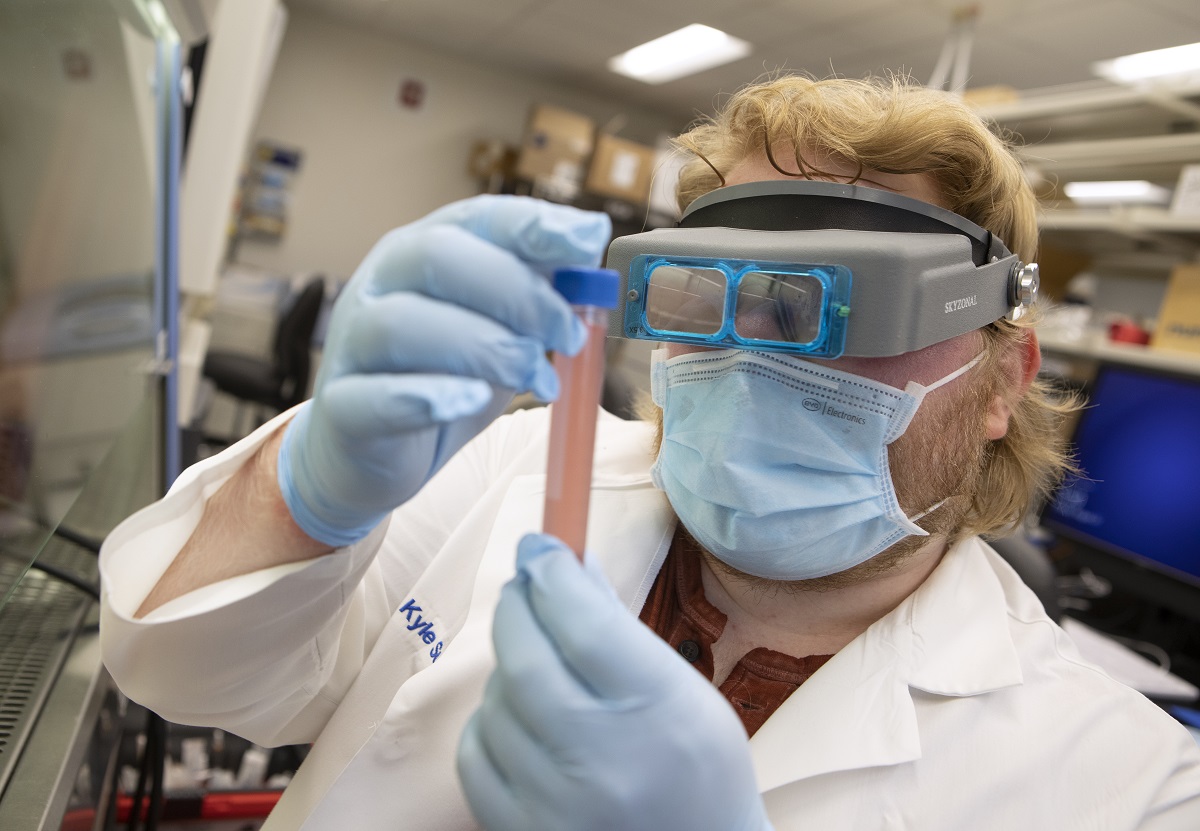Bringing help into focus: Office for Diversity, Equity and Inclusion benefits students at Penn State College of Medicine

Kyle Sundberg has always been curious about the world.
He may not be able to see it perfectly, but that hasn’t stopped him from exploring it.
Sundberg has a rare genetic condition called oculocutaneous albinism that causes him to have blurred vision. Even with glasses, he has the same clarity at 20 feet from an object that most people have at 100 feet from that object.
After developing a love for science in high school and college, he decided to pursue a PhD in biomedical sciences at Penn State College of Medicine. Sundberg works in a lab that is investigating whether certain drugs could be used as cancer therapeutics.
Graduate students are constantly reading, writing, looking at PowerPoints and carrying out experiments in the lab – all tasks that require a level of visual precision. Sundberg didn’t realize before coming to the College of Medicine what resources were available to assist him with these tasks.
Sundberg reached out to Paula Moodie, student disability and inclusion specialist in the College of Medicine’s Office for Diversity, Equity and Inclusion, after a faculty member suggested it. Moodie works with any physician assistant, medical or graduate students on campus who have physical or mental health disabilities – ranging from chronic pain to anxiety.
In order to understand the challenges Sundberg faces in his daily life because of his vision problem, Moodie shadowed him while he worked in the lab and attended class. Moodie observes students she works with and suggests tools that may be useful for different academic settings. The students try them and offer feedback on whether they work.
“Each student’s situation is unique, and they are the experts in their diagnosis,” Moodie said. “It’s important for me to work together with them to identify what tools might be useful in certain situations.”
The tool that has made the biggest difference is a headband magnifier Sundberg wears while reading or working at the lab bench. It has interchangeable lenses that provide varying levels of magnification. With the help of the magnifier, he can see objects between one and two feet away more clearly. He also uses a monocular telescope, which looks and functions like one side of a pair of binoculars.
This major improvement wouldn’t have been possible if Sundberg hadn’t come to Moodie to tell her about his disability and ask for accommodations. Self-disclosure can be a difficult step for students in the often-competitive world of academia and research.
“It can be hard for a student with a disability to admit they need help,” Moodie said. “They may have fears of being judged, stigmatized or made to feel less than others. A student’s willingness to step forward and seek assistance can lead to putting in place accommodations, which can allow them to pursue their academic goals in an equitable environment.”
While tools like the headband magnifier and monocular telescope have helped Sundberg improve his academics, they haven’t been able to help with the social challenges of his disability. In a crowded room or down a long hallway, he may not be able to identify or interact with people who are far away. But to a casual observer, it is difficult to tell he has a severe visual impairment, so that has led to some strained social interactions.
Despite the challenges he faces, Sundberg has always felt strong support from faculty, staff and his fellow students at the College of Medicine. He hopes by sharing his story that he can encourage other people – especially those with unseen disabilities – to come forward to get assistance.
“I’m always upfront with people about my disability and have gotten nothing but encouragement from the students and faculty here who ask how they can help,” Sundberg said. “Graduate school can be a stressful experience. I’ve encountered many people who are willing to support one another on this journey.”
If you're having trouble accessing this content, or would like it in another format, please email Penn State Health Marketing & Communications.
